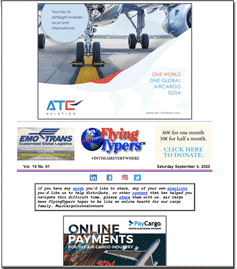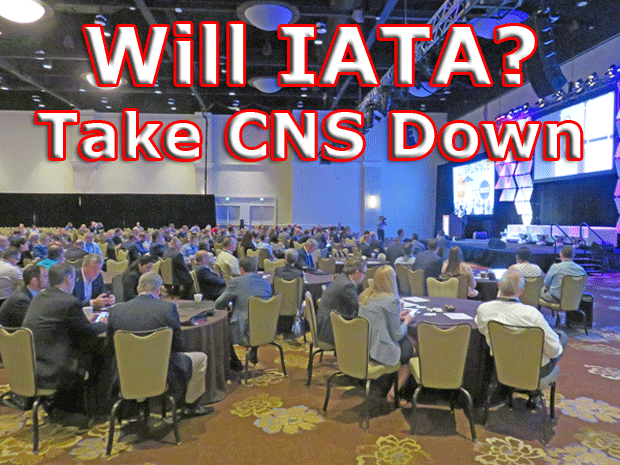 |
We
have been thinking about IATA as air cargo becomes more famous in the mainstream
media in regards to COVID-19 PPE flight performance.
In the face of all the attention, IATA has
shuttered all its cargo expertise in Geneva and Montreal.
Glyn Hughes, Head of Cargo, and others in
both locations have taken packages and are out.
Is Cargo Network Services (CNS) next? Do we
stand to lose the expertise of Mike White and his team?
Based on the history of IATA and CNS, as I
have covered the story for 40 years, even before CNS was formed, 2020 could
very well witness IATA gutting what is left of CNS—currently a team
of 3—and effectively destroying its position as the advocacy group
for the U.S. flags and their forwarder partners.
What that might mean is that the voice of
CNS, the expertise of CNS as a viable organization, will be gone.
That would mean terrible things for air cargo.
The CNS Partnership Conference held yearly in various locations in the U.S.
is without a doubt the best customer conference ever devised by air cargo
for doing bottom-line business. Not to mention the value of the daily activist
work that CNS performs on behalf of the airlines and the forwarders.
To be clear, CNS, under the aforementioned
doomsday scenario, might still be in business on paper and would likely
have a suit and a name to sidestep the antitrust rule which brought CNS
into formation 30 years ago in the first place.
Not sure how all of that would affect CASS
and some other processes.
Right now, closing in on another bailout,
you can really feel the pain and have some sympathy for the U.S. flag airlines
and, in fact, airlines everywhere that remain 70 percent empty in passenger
cabins.
So, the attention to the plight of an industry
organization like CNS takes a backseat to all the cargo in the passengers’
seats, as these airlines work furiously to save their failing businesses.
But without some outcry even at the suggested
possibility that CNS will disappear, odds are you might wake up one day
to the news that gone is this jewel of a group born in America as the world’s
first organization dedicated to bringing the airlines and their forwarder
partners together.
In these things IATA would be acting not unlike
when, up until CNS President Tony Calabrese’s retirement, CNS had
retained a distinct image and semi-independent agenda; IATA, then reined
it in turning it into a regional office. In principal, IATA has every right
to do as it sees fit, as CNS is an IATA company.
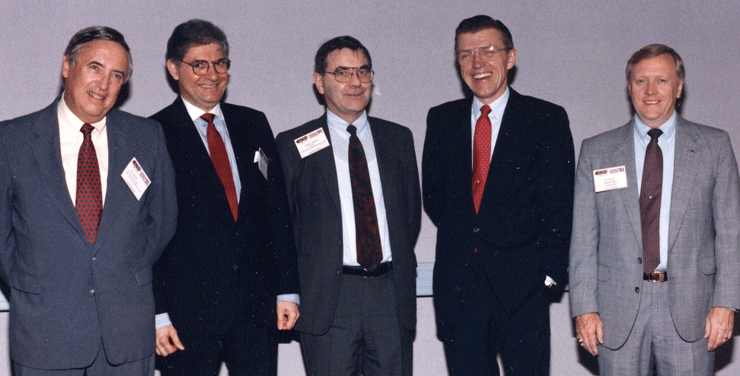
Networking at the second CNS Partnership
Conference in Dallas are (L to R) first CNS President Jack Lindsay,
second CNS President Anthony (Tony Calabrese), and original CNS Board
Members Brian Barrow and Buz Whalen, with American Airlines CEO Robert
Crandall between the two. |
Why CNS Matters
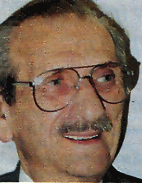 In
an era where everybody has a trade show or a webinar, it is good to share
once more the words of the late Richard Malkin, (left) the dean of air
cargo, who worked for the betterment of the industry and for CNS, and
then at 104 years of age shared these words. In
an era where everybody has a trade show or a webinar, it is good to share
once more the words of the late Richard Malkin, (left) the dean of air
cargo, who worked for the betterment of the industry and for CNS, and
then at 104 years of age shared these words.
“A quarter-century ago, I was invited
by the sparkling new Cargo Network Service to contribute my experience
to determine an answer to a vexing question:
“Should
CNS, or should it not, invest time, effort and money in mounting a truly
first-class air cargo conference?
“With the approval of CNS president
Jack Lindsay, the invitation had been extended by Anthony P. Calabrese,
then director of product development, who was aware of my intimacy with
the industry’s growing number of cargo conferences. I agreed to
cooperate.”
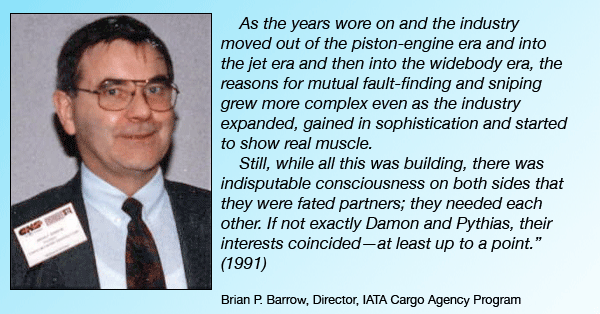 |
The Beginnings
“The scheduled airlines’ long-delayed
awakening of the shipper as an important source of revenue was enriched
by their flair for promotional ideas and public relations.
“Not much time passed before one of
the carriers invited a section of the shipping public—forwarders,
air cargo agents, industrial traffic managers and purchasing agents—to
a luncheon meeting where they would be treated to a lesson in air cargo
economics as well as to a tasty portion of roast beef.
“Competitor airlines gradually followed
with their own versions of satisfying appetites while getting across a
hard sell.
“It took a while, but as these meetings
became longer, more detailed, and more sophisticated productions, I gradually
became aware that something was amiss: In virtually every instance, the
airline representatives in the audience seriously outnumbered the customer
attendees.
“I editorialized on the problem. Didn’t
the lopsided audience division matter to the carriers? Were they delivering
the right message from the platform? What confined the users’ response
to disappointing limits? The few readers who bothered to answer failed
to cast convincing light on the puzzle.
“Tony Calabrese was one of my oldest
and closest friends in the industry.
“Typically, when we sat down with
cups of coffee to discuss the unfairness of an IATA rule or recent breakpoints
on electronic goods, it would wind up with criticism of a conductor’s
use of his baton or on concert artists’ foibles. This time, with
Jack Lindsay present at our meeting at CNS’ offices, Tony came right
to the reason for the meeting without the usual preliminary formalities:
“On the basis of my wide experience,
what is my personal reaction to a proposal to sponsor an annual air cargo
conference that would take it around the country?”
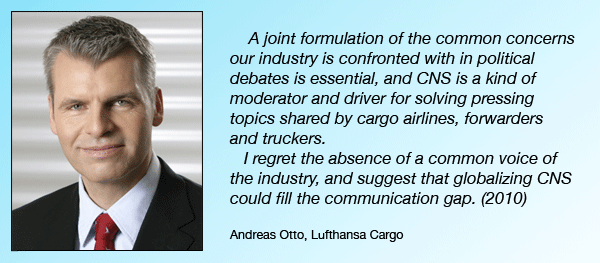 |
The Dreamer &
Doer Wins Out
“‘Oh, no,’ I groaned,
and I proceeded to repeat my argument especially when travel expenses
and hotel fees were involved. I predicted failure, and I foresaw myself
saying to Tony, ‘I told you so.’
“Tony was unfazed by my opposition,
arguing that CNS’ built-in membership of several thousand agents
represented a live pool of prospects. There existed an area of common
interest and values. I cited the example of the Civil Aeronautics Board’s
sponsorship of the one-day air cargo conferences scheduled in as many
as six cities throughout the United States.
“After the third meeting, appalled by the
paucity of active interest on the customer side, the board cancelled the
remaining shows.
“In Chicago, with John C. Emery, Jr. as
featured speaker, the meeting’s sponsor was forced to resort to
an invitation to a local business school’s transportation and export
students to fill vacant seats.
“Tony was probably aware of these incidents.
In his calm, evenly stated way, he bore down on his confidence in the
CNS agents’ homegrown support.
“This was basic.
“There were, too, the forwarders and shippers.
“In the end, Lindsay (after whose retirement
a couple of years later Tony was to succeed as CNS president) went along
with Tony, and the first of Partnership Conferences was born.”
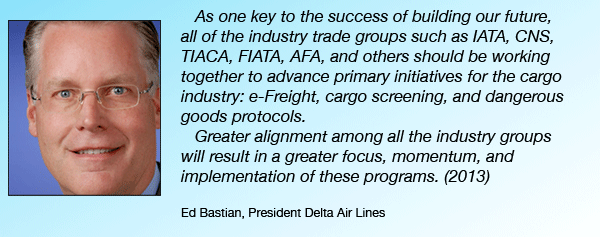 |
The Great CNS Partnership Conference
“Over the years the Partnership Conference,
which sprang from Tony’s fertile mind, was recognized as one of
the world industry’s best.
“During the closing hours of the initial
meeting, Tony and I were sitting next to each other at a dinner table.
We chatted about the day’s highlights. He had an idea that he wanted
to implement next year, and before he could get into the details, he was
interrupted by an aide who handed him a sheet of paper. Tony glanced at
it briefly, smiled, then the smile broadened into a grin.
“Customer attendance 18% over airline attendance.”
“Whereupon he leaned over to me and sweetly
whispered in to my ear, ‘I told you so.’
Tony Gave Wings To The Partnership
Conference
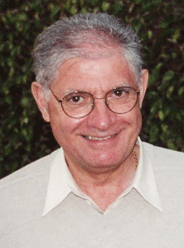 People have called CNS Partnership a lot of things over its first quarter
century, but the gathering has never been slow or late in providing a
first-class venue for conducting business.
People have called CNS Partnership a lot of things over its first quarter
century, but the gathering has never been slow or late in providing a
first-class venue for conducting business.
Credit the individual who dreamed up the Partnership
Conference in the first place—former CNS President Tony Calabrese
(1986/2006)—for ensuring there was plenty of time (and space) for
cargo executives to feel they had discovered the perfect spot to cut a
deal all by themselves.
“When I started at CNS, the airlines and
the forwarders, even the airlines and airlines, barely spoke to each other,”
Tony said as CNS celebrated its 25th Anniversary in 2011.
“What happened right from the very first
Partnership Conference in 1986 is that everybody discovered, through understanding,
that our supposed differences were more myth than fact,” Tony said.
“Recognizing that personal relationships
are an important part of the way the industry does business, and our success
in attracting key decision makers not just from the U.S., but from around
the globe, we deliberately structured our program to allow people time
to meet and conduct business without detracting from the main conference
sessions.
“Our business sessions were meant to stimulate
debate and generate new ideas – to not allow people the opportunity
to build on this would be doing them a disservice.
“CNS takes considerable pride in the success
of the Partnership Conference, and the role it has played in bringing
together the prime movers of the air cargo industry to foster the development
of airline / forwarder relationships.”
Tony Calabrese shepherded this North American
gathering for 15 years until his retirement in 2006.
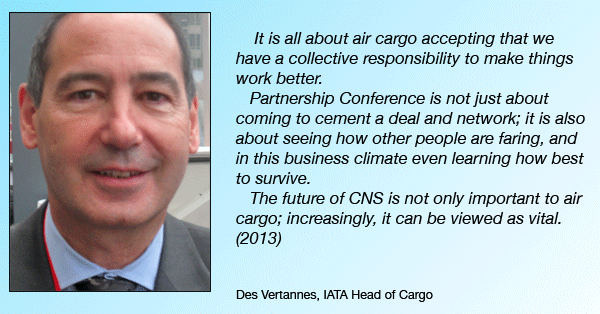 |
Anti-Trust Origins
For the record, CNS was born from IATA losing
its anti-trust immunity, a consequence of the Competitive Marketing investigation
and subsequent deregulation, which is the reason the American-based organization
had to keep at arm’s length relationship with IATA for many years.
“For years we struggled for recognition
and many people thought CNS was not more than the CASS settlement system.
“To change that perception, we started
CNS Focus as a four-page newsletter and sent it around to our members.”
The Airline Forwarder Relationship
“We also launched The CNS Partnership Conference.
But I wanted our conference to be different. To us ‘Partnership’
was never about CNS, it was more about industry stakeholders’ objectives
and needs. We never looked at the event as a big money-maker either, but
rather our approach was to do what was good for air cargo.
“The purpose was to bring airlines and
forwarders together. From that simple premise we held our first conference
in Tarpon Springs (near Tampa), Florida. We set up meeting tables of ten
places each in the hall and assigned luck-of-the-draw seating to everyone.
“The idea right out of the gate was to
keep people from congregating with co-workers or best friends. We wanted
to stimulate the conversation, the floor discussion, even debate,”
Tony concluded in 2011.
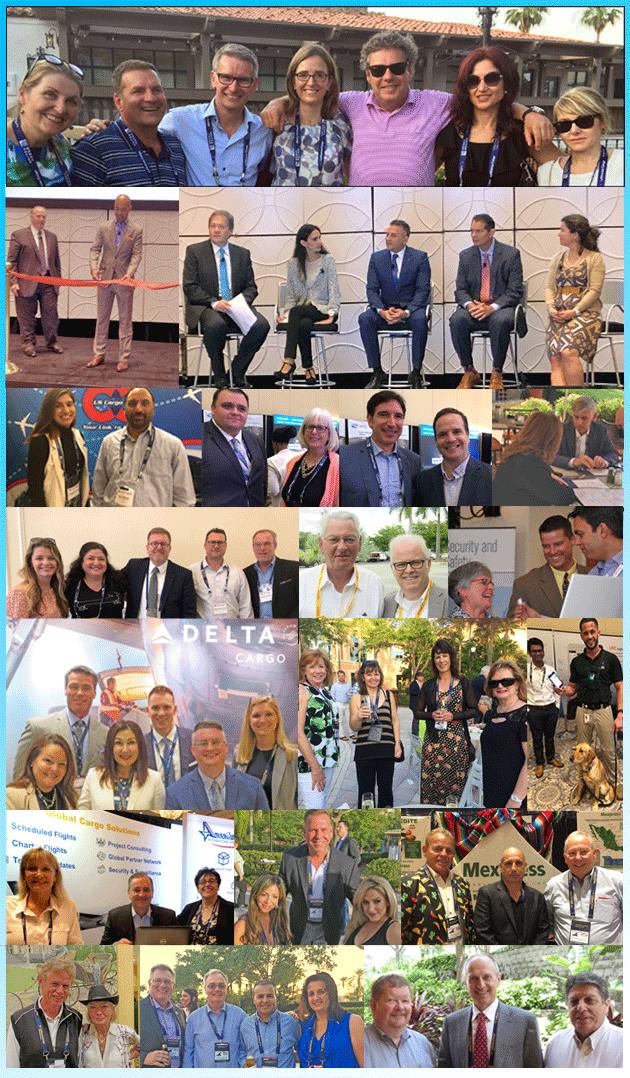 |
Mike White, President of CNS
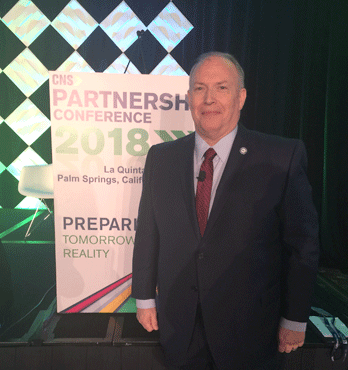 Not since Tony Calabrese served as President during those heady days of
hope for air cargo, has CNS had a more inventive and balanced advocate
for air cargo and the airline forwarder shipper proposition than Mike
White.
Not since Tony Calabrese served as President during those heady days of
hope for air cargo, has CNS had a more inventive and balanced advocate
for air cargo and the airline forwarder shipper proposition than Mike
White.
I sometimes think as the chalets fill with customers
at the annual Partnership Conference and then everybody gets together
around the open trade show display halls and evening garden parties that
Mike White brings the full menu to CNS leadership with so much more to
give.
Mike is a global air cargo treasure, and to lose
CNS as he works to stabilize air cargo by bringing out the best and the
brightest as the pandemic lessens, would be nothing less than a tragedy
for the advancement of air cargo.
To underscore why CNS Partnership and its current
leadership matters, here for the record is what Mike said a few years
ago about Tony Calabrese:
“I have known Tony for years and I always
kept in my mind his words about the CNS Partnership event he started.
“‘Mike,” he said, “we
started this to bring parties together and never forget why the word partnership
has made the event such a success.
“So, we continue to carry on what Tony
started,” Mike told me.
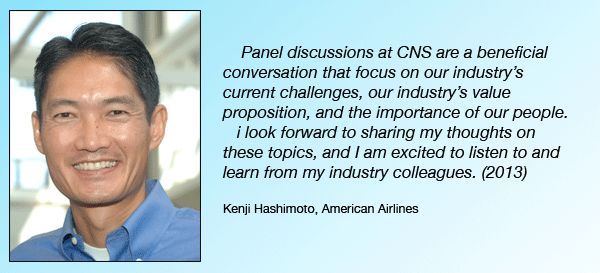 |
Speed dating Between Providers
& Customers
“At CNS our team reviews the feedback from
attendees and listens to what our guests want and that continues to help
make this the premier air cargo event to attend.
“Networking and one-on-one meetings are
a lot of work.
“Many call this conference speed-dating
between providers and customers.”
“I hear every year from attendees that
they are worn out, but in a good way. Where else can we see so many customers
in one place and one time?
“For many, more business is usually accomplished
during the three-day event than the rest of the year combined,”
Mike said.
Geoffrey
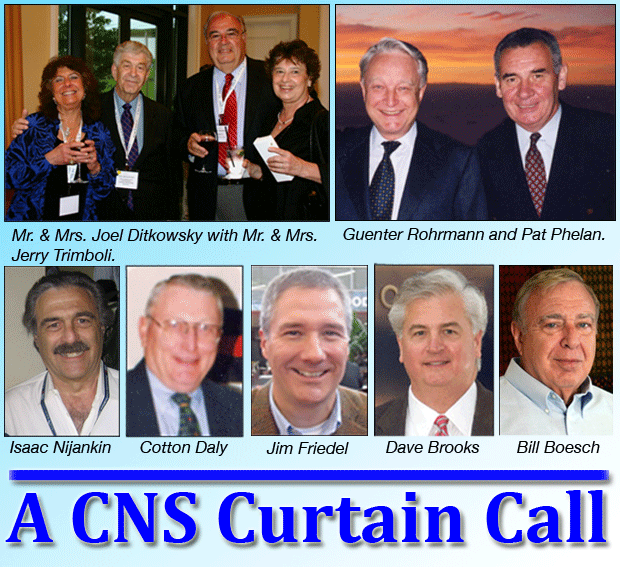 |
Given these uncertain times, I am
unsure how many more chances we will have to recall people that
made Cargo Network Services a one of a kind successful organization.
But here goes as we bring back for
one more curtain call some of the many people who during the past
40 years have given of themselves in a genuine effort to make the
air cargo industry better by supporting CNS.
Guenter Rohrmann was a very dynamic
board member and Chairman of CNS.
During the early years, the CNS Board—both
airlines and forwarder members—really gave the organization
purpose.
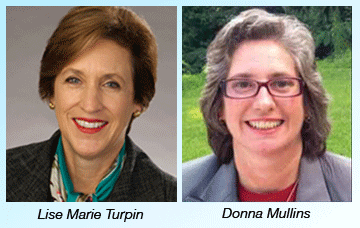 It
was the CNS members who carried the ball and helped make things
work. It
was the CNS members who carried the ball and helped make things
work.
People like Cotton Daly (TWA), Buz
Whalen (JAL), Pat Phelan (Aer Lingus), Ed Moritz (British), Isaac
Nijankin (Varig), Jerry Trimboli (SAS), Bill Boesch (AA), Dave Brooks
(AA), Lise-Marie Turpin, Air Canada, Jim Friedel (NWA), and of course
others, including brokers and forwarders like Donna Mullins, Joel
Ditkowsky and Jo Frigger (EMO Trans) to name three front-line outstanding
leaders.
“Our best work has been bringing
the industry together,” Jo Frigger said this week.
Thinking CNS Partnership, it’s
good to remember one more time, and in fact should never be forgotten,
the dedication and hard work from the man who transmuted good ideas
into a great transportation organization—Tony Calabrese.
Today Mike White, like Tony Calabrese,
makes CNS great by carrying the organization around on broad shoulders,
working to make a better air cargo industry every day.
Geoffrey |
|




